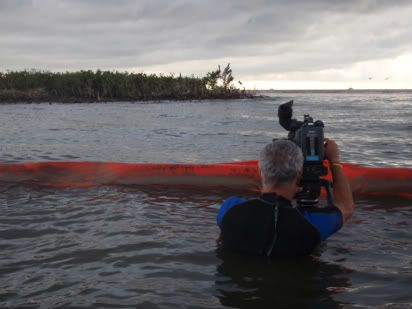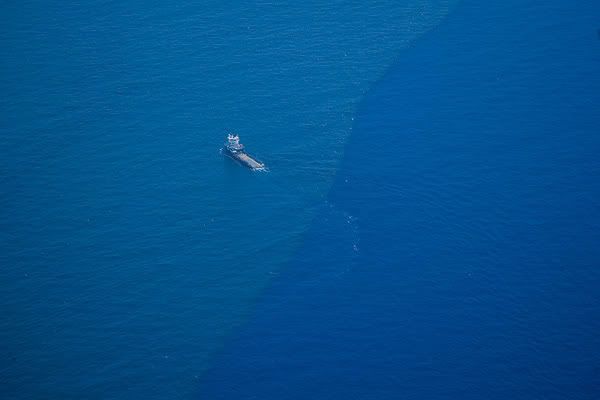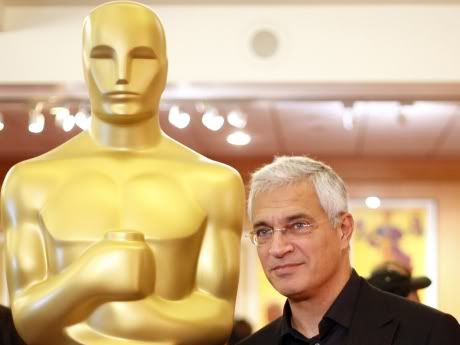MURDER, POLITICS, AND THE END OF THE JAZZ AGE
by Michael Wolraich

(image, Gina Papabeis, OPS)
After the unprecedented success of his first film, the Oscar-winning documentary “The Cove,” director and photographer Louie Psihoyos has turned his attention from the the wholesale slaughter of Dolphins in Taiji, Japan to the plight of humanity. Of course, that’s been his focus all along.
“The path that we’re on is so destructive for the future and humanity,” said Psihoyos in a telephone interview. “It’s like a perfect storm going on in the ocean right now.”
Psihoyos and the Oceanic Preservation Society had begun work on “The Singing Planet: The whole world is singing, we just haven’t been listening,” a 3-D documentary that will focus on the degradation of the world’s oceans and the “mass species extinction event” currently in progress in the seas, when the British Petroleum Deep Horizon oil rig exploded.
“We had started and realized we had to get down there,” said Psihoyos, 52. “We were lucky that the press liaison for the Coast Guard had seen “The Cove” so we got pretty good access down there.”
What Psihoyos saw was not just an environmental catastrophe, but the people affected by it.
“I haven’t seen a lot of major coverage of how this has affected people’s lives down there,” said Psihoyos. “What is the loss If you’re a fisherman and that’s all you know? It’s not like you just move somewhere else.
“Everybody I talked to down there is touched by this,” added Psihoyos. “The devastation is felt miles inland. Everybody is connected to it, everybody is losing something. I don’t think BP has deep enough pockets to pay everybody.”
But while Psihoyos is sympathetic to the plight of Gulf fisherman that have seen their livelihoods taken from them, he made it clear that he would steer clear of any seafood taken from the Gulf of Mexico.
“I wouldn’t want to eat the seafood coming out of there,” said Psihoyos. “I would just be really cautious about eating fish from the Gulf until thorough studies are done on their toxicology.”
While the Gulf of Mexico oil disaster will play an important part in the new documentary, Psihoyos was quick to point out that the onus of the film would be on the dramatic devastation all the world’s seas have endured, and how it will affect humanity should it continue to go unchecked.
“We’re losing plankton and people don’t understand that two out of three breaths you take come from plankton,” said Psihoyos, whose photographs have been featured in numerous publications including National Geographic, New York Times Magazine and Sports Illustrated. “You have to connect the dots. Why is plankton important to someone in Colorado? Well, it helps you breathe.”
Much like “The Cove,” Psihoyos and crew are looking to use the film as a springboard to get the public involved in working to use renewable energy sources and kick the oil habit. Unlike with the Academy Award-winning documentary about the slaughter of dolphins in Taiji, Japan, this time they’ll get a head start with the activism.
“We didn’t do the social action campaign until ‘The Cove’ was done, on this one we’re starting two years in advance,” said Psihoyos. “We’re going to set aside 2.5 million for social media outreach.”
The new film will also focus on how an oil-based economy could be humanity’s undoing, and that it’s coming at a much steeper price than most people understand. Psihoyos is quick to point out that Americans often fail to see the true cost of gasoline.
“If people understood the full cost of the gas they use they wouldn’t use it,” said Psihoyos, who himself drives a solar-powered vehicle. “Gas doesn’t cost $2 a gallon, it costs more like $18 a gallon when you count all the costs, including the wars to protect our oil.”
In the end, Psihoyos said that his new film isn’t about taking on the oil companies (though they may see it differently), but about getting people involved in making the switch to alternative energy sources, many of which are readily available.
“The fight really isn’t against the oil companies it’s against ourselves,” said Psihoyos. “Of course the oil companies will fight it and send out disinformation, but I’m not afraid of them.
“Some times these battles take years, they might take decades. Eventually people will change, the idea is to speed it up,” added Psihoyos.
“It’s a huge story. The biggest environmental catastrophe in my generation. I think the effects of this are still to be seen.”
“I did four trips by planes and helicopters and we flew 100 miles away from the spill and there was still oil everywhere. This thing is huge.”
“We went with a BP representative and they took us to fairly clean beaches. I know there are worse ones than they showed us, they just don’t want people to know.”
“They closed certain fishing grounds but the fish don’t know that, they travel all over.”
“The other bigger story is what is this dispersant doing in the water? It’s so oxymoronic, you’re dispersing it and then trying to collect it? That doesn’t make any sense at all.”
“Dispersant is like turpentine and there’s been a million gallons of that dumped into the ocean.”
“It’s gorgeous down there, the beaches rival everywhere in the world. Beautiful white sand beaches. And now kids are playing in water that’s toxic. What’s amazing is that this whole episode happened and there are still people at the beach where there’s 200 parts per million of oil in the water.”
“Where else does the murder victim get to go in and dictate the terms of the murder scene. (British Petroleum doesn’t) want you to see the whole story down there. And if they’re allowed to control the media they will.”
“It’s doing pretty well in Japan but I think the real effect will happen when it comes out on DVD, I think people want to see it but are still nervous about going to theaters. It’s their culture.”
“With ‘The Cove,’ we learned that the worst thing you can do with the environment is make a movie about it. We’re fully solar powered now, and make more energy than we need.”
“I’m hopeful things will change there, but will the killings start again on Sept. 1? Probably. But there will be less demand.”
Photos via OPS
–WKW
Crossposted at William K. Wolfrum Chronicles